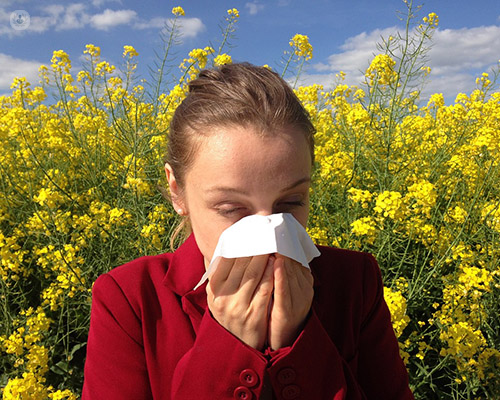All you need to know about allergic rhinitis
Written by:Allergic rhinitis occurs as a result of the lining of one’s nose becoming inflamed. It can, in some cases, be an extremely serious medical condition, but, fortunately, the condition can be treated in a variety of different ways.
In our latest article, revered consultant paediatric allergist, Dr Helen Brough, tells us how allergic rhinitis is caused, outlines what the main symptoms are, and explains how it can be most effectively treated.

Can you detail what exactly allergic rhinitis is?
Allergic rhinitis is an allergic inflammation of the lining of the nose. It can also cause lots of other symptoms, such as allergic rhinoconjunctivitis, which can also lead to inflammation of the lining of the eyes.
Allergic rhinitis can also affect inside one’s ears, it can make you feel itchy at the back of your throat and tongue, can also cause a bit of a cough and make your nose feel very congested. In patients who suffer from asthma, we often see that they suffer from an allergic cough as a result of allergic rhinitis.
Allergic rhinitis normally occurs due to an inhalant allergen, such as seasonal allergens like grass and pollen, as well as perennial allergens (all year round) such as house dust mite, cat dander or dog dander if the family lives with that animal.
What is the most common cause of allergic rhinitis?
The most common cause of allergic rhinitis in the UK is grass palynology, which leads to itching, sneezing, congestion, and patients having to constantly rub their eyes and nose. People generally suffer from this from May to the end of August.
This allergic condition can be particularly severe if, on that day, the pollen count is high. Fortunately, today, there are numerous amounts of applications that can tell you when the pollen count is high.
The second most common cause of allergic rhinitis then is house dust mite, which can cause worsening symptoms in the winter, when there is more dust mite around in the house. Often, house dust mite allergy causes a lot of congestion, feeling that you just can’t seem to get rid of a cold, headaches, and can also lead to dark circles under the eyes.
What are the main warning signs and symptoms?
The main symptoms to watch out for are red, swollen eyes, clearing of one’s throat due to the presence of mucus, itchy nose, itching inside the ears, and a dry, irritated cough at the back of the throat.
How is allergic rhinitis treated?
There are three aspects to the treatment of allergic rhinitis. The first is allergen avoidance. So, once patients know what they are allergic to, they can avoid those allergic triggers. The second is symptomatic treatment. This usually comprises of an antihistamine, which should be a non-sedative one.
The gold standard for symptomatic treatment for allergic rhinitis is nasal steroid sprays, because they not only treat the itching and the runny nose, but also the nasal congestion. There are also some very effective eye drops that contain antihistamines.
The final aspect of treatment is immunotherapy. People can effectively take drops or tablets under the tongue in order to change the way their immune system responds to any given allergen that is causing allergic rhinitis. This produces tolerant antibodies.
When is the condition considered serious?
It is very serious, especially in situations where children are affected in school, when one’s sleep is affected, and when children find it difficult to go outside and enjoy activities because they have such severe symptoms. The condition can also lead to sinusitis.
Dr Helen Brough is a highly esteemed consultant paediatric allergist who specialises in conditions such as allergic rhinitis. Visit her Top Doctors profile today and consult with her if you are concerned about your child’s allergies.


